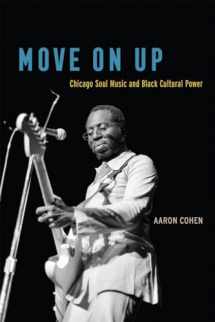
Move On Up: Chicago Soul Music and Black Cultural Power
ISBN-13:
9780226653037
ISBN-10:
022665303X
Edition:
First Edition
Author:
Aaron Cohen
Publication date:
2019
Publisher:
University of Chicago Press
Format:
Paperback
272 pages
Category:
State & Local
,
United States History
,
Popular Culture
,
Social Sciences
,
Americas History
FREE US shipping
Rent
35 days
Due Jun 07, 2024
35 days
from $22.90
USD
Book details
ISBN-13:
9780226653037
ISBN-10:
022665303X
Edition:
First Edition
Author:
Aaron Cohen
Publication date:
2019
Publisher:
University of Chicago Press
Format:
Paperback
272 pages
Category:
State & Local
,
United States History
,
Popular Culture
,
Social Sciences
,
Americas History
Summary
Move On Up: Chicago Soul Music and Black Cultural Power (ISBN-13: 9780226653037 and ISBN-10: 022665303X), written by authors
Aaron Cohen, was published by University of Chicago Press in 2019.
With an overall rating of 3.7 stars, it's a notable title among other
State & Local
(United States History, Popular Culture, Social Sciences, Americas History) books. You can easily purchase or rent Move On Up: Chicago Soul Music and Black Cultural Power (Paperback, Used) from BooksRun,
along with many other new and used
State & Local
books
and textbooks.
And, if you're looking to sell your copy, our current buyback offer is $0.34.
Description
A Chicago Tribune Book of 2019, Notable Chicago Reads
A Booklist Top 10 Arts Book of 2019
A No Depression Top Music Book of 2019
Curtis Mayfield. The Chi-Lites. Chaka Khan. Chicago’s place in the history of soul music is rock solid. But for Chicagoans, soul music in its heyday from the 1960s to the 1980s was more than just a series of hits: it was a marker and a source of black empowerment. In Move On Up, Aaron Cohen tells the remarkable story of the explosion of soul music in Chicago. Together, soul music and black-owned businesses thrived. Record producers and song-writers broadcast optimism for black America’s future through their sophisticated, jazz-inspired productions for the Dells and many others. Curtis Mayfield boldly sang of uplift with unmistakable grooves like “We’re a Winner” and “I Plan to Stay a Believer.” Musicians like Phil Cohran and the Pharaohs used their music to voice Afrocentric philosophies that challenged racism and segregation, while Maurice White of Earth, Wind, and Fire and Chaka Khan created music that inspired black consciousness. Soul music also accompanied the rise of African American advertisers and the campaign of Chicago’s first black mayor, Harold Washington, in 1983. This empowerment was set in stark relief by the social unrest roiling in Chicago and across the nation: as Chicago’s homegrown record labels produced rising stars singing songs of progress and freedom, Chicago’s black middle class faced limited economic opportunities and deep-seated segregation, all against a backdrop of nationwide deindustrialization.
Drawing on more than one hundred interviews and a music critic’s passion for the unmistakable Chicago soul sound, Cohen shows us how soul music became the voice of inspiration and change for a city in turmoil.
A Booklist Top 10 Arts Book of 2019
A No Depression Top Music Book of 2019
Curtis Mayfield. The Chi-Lites. Chaka Khan. Chicago’s place in the history of soul music is rock solid. But for Chicagoans, soul music in its heyday from the 1960s to the 1980s was more than just a series of hits: it was a marker and a source of black empowerment. In Move On Up, Aaron Cohen tells the remarkable story of the explosion of soul music in Chicago. Together, soul music and black-owned businesses thrived. Record producers and song-writers broadcast optimism for black America’s future through their sophisticated, jazz-inspired productions for the Dells and many others. Curtis Mayfield boldly sang of uplift with unmistakable grooves like “We’re a Winner” and “I Plan to Stay a Believer.” Musicians like Phil Cohran and the Pharaohs used their music to voice Afrocentric philosophies that challenged racism and segregation, while Maurice White of Earth, Wind, and Fire and Chaka Khan created music that inspired black consciousness. Soul music also accompanied the rise of African American advertisers and the campaign of Chicago’s first black mayor, Harold Washington, in 1983. This empowerment was set in stark relief by the social unrest roiling in Chicago and across the nation: as Chicago’s homegrown record labels produced rising stars singing songs of progress and freedom, Chicago’s black middle class faced limited economic opportunities and deep-seated segregation, all against a backdrop of nationwide deindustrialization.
Drawing on more than one hundred interviews and a music critic’s passion for the unmistakable Chicago soul sound, Cohen shows us how soul music became the voice of inspiration and change for a city in turmoil.


We would LOVE it if you could help us and other readers by reviewing the book
Book review

Congratulations! We have received your book review.
{user}
{createdAt}
by {truncated_author}



